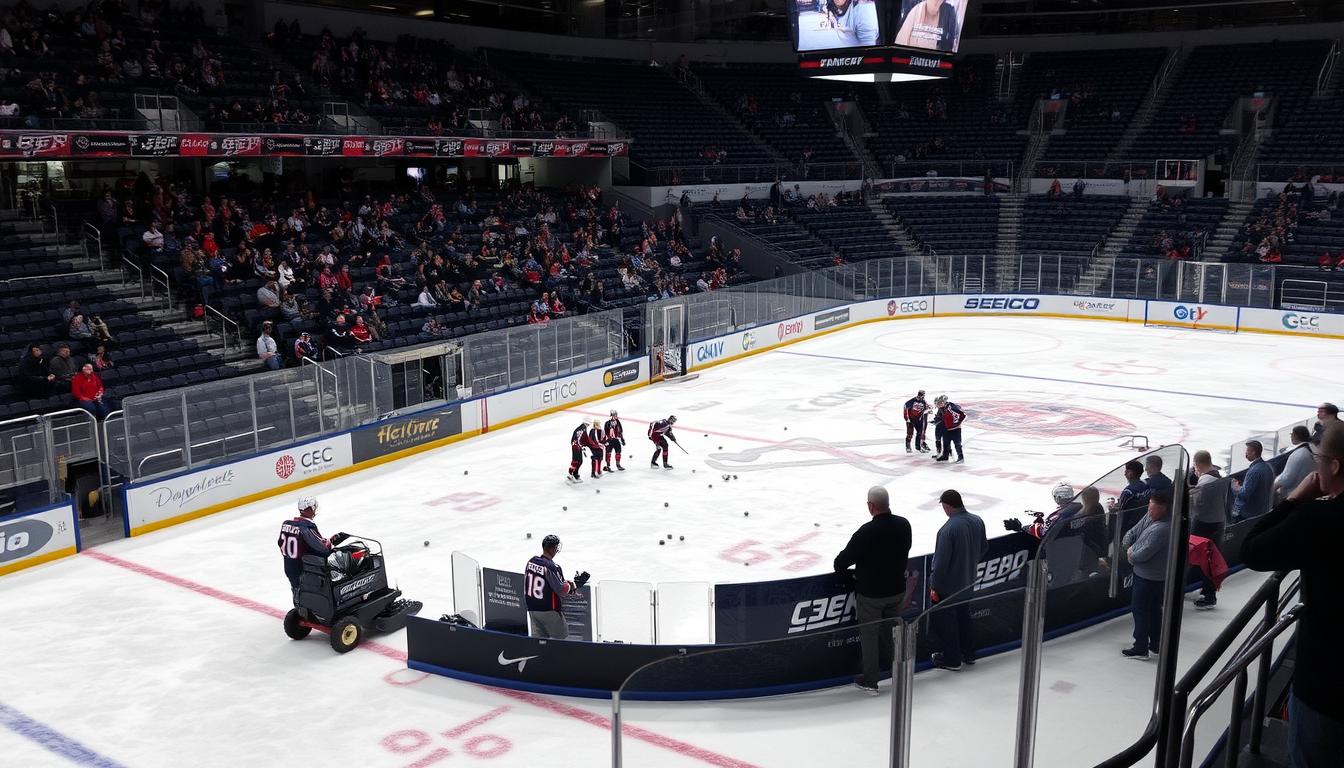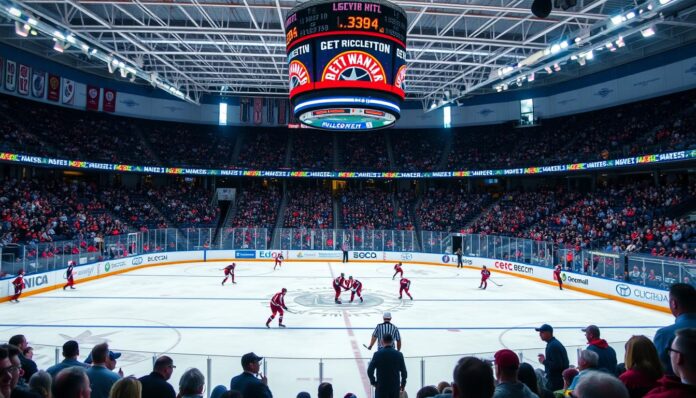NHL games thrill fans with fast-paced action and fierce competition. Let’s explore how long these exciting matches typically last.
A regular NHL game lasts 60 minutes of playtime. It’s split into three 20-minute periods.
However, the actual game can be longer. Overtime, shootouts, and unexpected events can extend the duration.
A vibrant hockey rink scene showcasing a clock counting down, players in action on the ice, and colorful fan banners in the crowd emphasizing the game’s duration with dynamic movement and energy.
Knowing game length helps you better plan your viewing time and enjoy the sport’s finer points.
We’ll look at regular season and playoff game lengths. You’ll learn what makes each game unique.
Understanding the Structure of an NHL Game
The NHL is famous for its exciting, fast-paced games. Each game has three 20-minute periods with two breaks in between.
Teams try to score more goals than their rivals in 60 minutes. If tied, a 5-minute overtime period follows.
The first team to score in overtime wins. If no one scores, the game goes to a shootout.
This structure keeps fans excited throughout the game. Every minute could bring a game-changing moment, making NHL games thrilling.
Average Duration of a Regular Season Game
NHL games usually last 2.5 to 3 hours. This includes playing time, breaks, and possible overtime.
The main game lasts 60 minutes. It’s split into three 20-minute periods.
Games can go longer due to stops and penalties. If tied, there’s a 5-minute overtime.
Breaks between periods last about 18 minutes. Players rest, and the ice is cleaned during this time.
Knowing game length helps fans plan better. It also helps TV stations and arenas run smoothly.
Playoff Game Duration
NHL playoff games can last longer than regular season matches. The sudden death overtime format causes this difference.
Teams play until one scores the winning goal, which ensures a clear winner even after multiple overtime periods.
Regular season games last 60 minutes. Playoff games can go much longer.
Some of the most extended NHL games happened during playoffs. These matches often went into multiple overtime.
This extra time makes playoff games exciting for fans. It creates a thrilling experience that keeps viewers hooked.
Teams play 20-minute periods until someone scores. This can make games last for hours.
The sudden-death format adds drama to playoff games. It means the game could end at any moment.
Playoff games are usually longer than regular season ones. Fans can expect more intense, high-stakes hockey during playoffs.
Factors Influencing Game Length
NHL hockey games usually last about two hours and 20 minutes. But some things can make them longer.
Penalties can cause delays. Coaches’ timeouts can pause the game, too.
Video reviews are used to check close calls and goals. These reviews add time to the game.
The game’s intensity can affect its length. Close matches often have more stoppages.
All these factors work together. They create an exciting experience for fans.
A hockey rink scene during a game delay features empty benches with players looking on anxiously, an ice surface reflecting the arena lights, scattered pucks on the ice, a Zamboni parked at the side, and fans in the stands showing mixed reactions, conveying a sense of anticipation and disruption.

Different Types of Hockey Leagues
Hockey game length varies by league type. The NHL sets the standard for pro hockey in North America.
Other leagues exist at minor and international levels. They have unique game structures and time frames.
Minor league hockey includes the AHL and ECHL. Their games are often shorter than those of the NHL.
These leagues help players reach the NHL. Games usually last 2-2.5 hours.
International tournaments have different formats. The Olympics and World Championships feature shorter game times.
Periods range from 15 to 20 minutes. Total game time is about 1.5 to 2 hours.
College hockey is popular in the United States. NCAA games last around 2-2.5 hours.
They have three 20-minute periods, like the NHL. But rules and overtime procedures differ.
Knowing game lengths helps fans and analysts. It’s also useful for those in sports operations.
Fan Experience During Games
Hockey games offer more than just on-ice action. They provide an electrifying hockey arena atmosphere and a thrilling game-day experience.
Fans can enjoy pre-game activities like live music and interactive zones. These build excitement for the upcoming match.
During breaks, cheerleaders, mascots, and bands keep the energy high, ensuring the crowd stays engaged throughout the event.
Game length affects the fan experience significantly. Longer games allow more time to enjoy the atmosphere.
Shorter games feel more intense with less downtime. The ideal length keeps fans entertained throughout the event.
Many NHL teams offer post-game events like autograph sessions. These extras help fans connect with their favorite players.
Behind-the-scenes tours give fans a deeper connection to their team. This enhances the overall experience for hockey enthusiasts.
Importance of Game Duration
Hockey game length matters a lot. It affects TV scheduling and arena bookings.
Networks need predictable game times. This helps them plan their broadcasts smoothly.
Shorter games allow more TV coverage. Longer ones can mess up broadcast schedules.
Game duration impacts arena scheduling, too. Teams need to use their venues wisely.
Shorter games give arenas more flexibility. They can host more events and make extra money.
Game length affects player health. Long games can tire athletes and cause injuries.
Balanced game times help players perform well. This is crucial throughout the season.
Game duration impacts more than play. It affects media, arenas, and player health.
Conclusion
NHL games usually last 2-3 hours. Regular season games take about 2.5 hours, and playoff games can last three or more.
Overtime, penalties, and play pace affect game length. These factors can make games longer or shorter.
We’ve covered the duration of the NHL game in detail, including game structure and average lengths for different types.
Fans can now plan better for watching games. They know what to expect in terms of time.
This guide helps both new and longtime fans by clearly illustrating the length of the NHL game.
You can now enjoy hockey games more understandingly. The NHL offers exciting and unpredictable matches for all viewers.
FAQ
How long are NHL hockey games?
NHL hockey games usually last 2.5 to 3 hours. This includes game time and possible overtime periods.
What is the structure of an NHL game?
NHL games have three 20-minute periods with two breaks. The total game time is 60 minutes.
Games can go longer with overtime and shootouts.
How long are regular season NHL games?
Regular season NHL games typically run 2.5 to 3 hours. The actual playing time is about 60 minutes.
Things like penalties and video reviews can make games longer.
How long are NHL playoff games?
Playoff games can be much longer than regular season ones, and overtime has no time limit.
Games keep going until one team scores the winning goal.
What factors can influence the length of an NHL game?
Penalties, timeouts, and video reviews can prolong NHL games. The number of these events varies in each game.
How do game durations differ across various hockey leagues?
Game lengths can change in different hockey leagues. Minor leagues, world games, and college hockey may have different rules.
These changes can affect how long their games last.
How does the game duration affect the fan experience?
Game length impacts fan activities before, during, and after the match. Therefore, longer games may require changes to arena events.
Why is the duration of an NHL game necessary?
NHL game length matters for TV, arena planning, and player rest. Steady game times help with media, arena work, and player health.
You can also read more : Doodle Champion Island Games: Your Ultimate Guide



